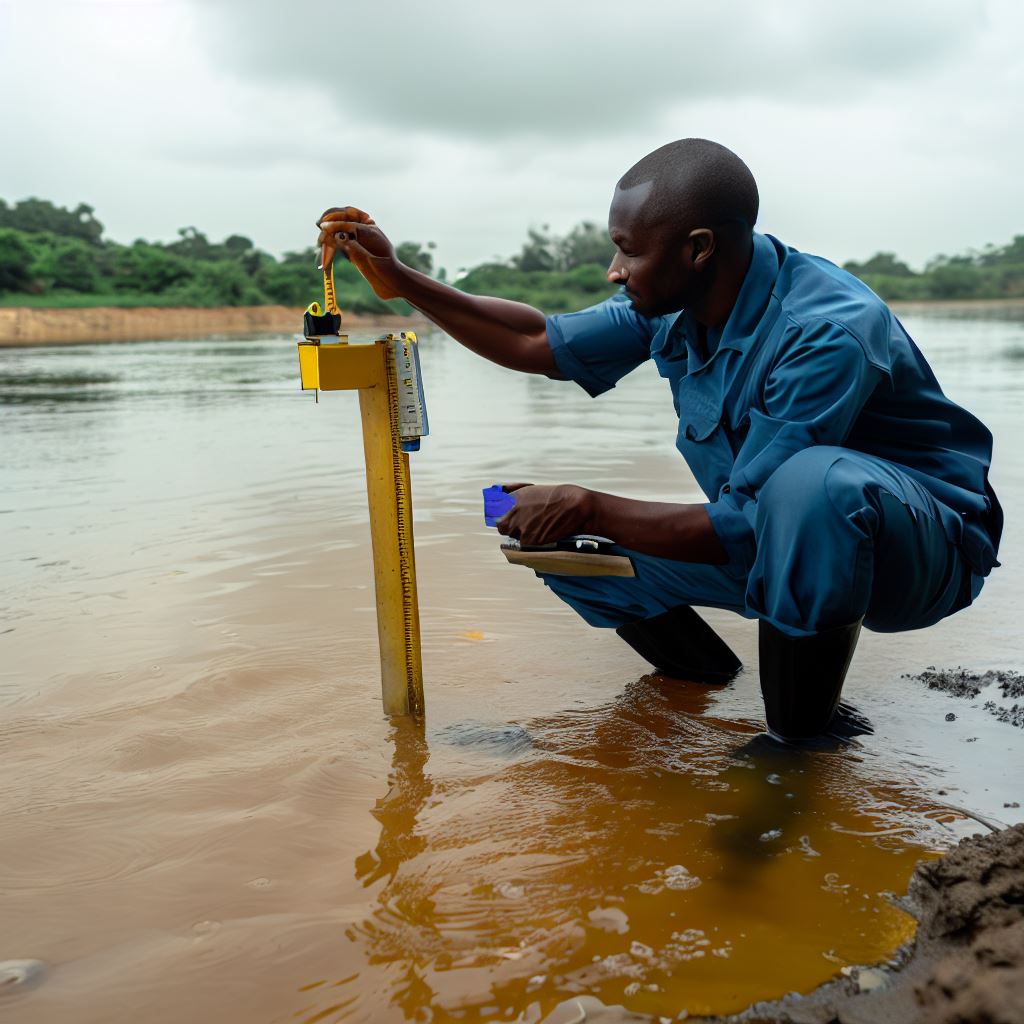Introduction
Definition of Sustainable Development
Sustainable development balances economic growth, environmental protection, and social equity for lasting prosperity.
Importance of Sustainable Development in Nigeria
Nigeria seeks sustainable solutions to address environmental challenges, foster economic growth, and improve social equity.
Overview of hydrologists in Nigeria
Role and responsibilities of hydrologists
- Hydrologists in Nigeria are experts who study and manage water resources in the country.
- They are responsible for monitoring water quantity and quality, especially in rivers, lakes, and underground sources.
- Hydrologists also analyze rainfall patterns, groundwater levels, and evaporation rates to understand the water cycle.
- They use sophisticated equipment and techniques to collect data and conduct hydrological assessments.
- The information gathered by hydrologists helps in planning water resource management and sustainable development.
Importance of hydrologists for sustainable development
Hydrologists are vital for ensuring sustainable water use and management in Nigeria.
Their roles and contributions encompass:
- Preventing water scarcity with precise data on water availability and usage.
- Identifying risks like floods or droughts through water resource understanding.
- Developing mitigation strategies for long-term water availability.
- Monitoring water pollution and proposing remedies for environmental protection.
- Supporting sustainable agriculture, industry, and urban planning.
- Facilitating effective water policy-making.
- Collaborating with experts in related fields.
- Guiding infrastructure projects, including dams and water supply systems.
- Promoting water conservation and proper usage awareness.
- Advising on wastewater treatment and reuse.
- Active participation in water resource research projects.
- Offering recommendations for sustainable development policies.
- Enhancing water governance through collaboration.
- Addressing challenges posed by population growth and climate change.
- Anticipating water-related challenges for a resilient, sustainable future in Nigeria.
Read: Top Universities for Chemistry in Nigeria: A Review
Challenges in water resources management in Nigeria
Water scarcity and its impact
- Causes of water scarcity: Water scarcity in Nigeria is caused by factors such as population growth, climate change, and inadequate infrastructure.
- Effects on society and the environment: Water scarcity leads to limited access to clean water, poor sanitation, food insecurity, and conflicts over water resources. It also affects ecosystems, leading to reduced biodiversity and endangered species.
Pollution and its consequences
- Sources of water pollution: Water pollution in Nigeria is primarily caused by industrial activities, agricultural runoff, and inadequate sewage systems
- Impacts on health and ecosystems: Water pollution, caused by industrial discharges, agricultural runoff, and poor sewage systems, harms health and ecosystems. Inadequate infrastructure exacerbates water scarcity due to population growth and climate change.
This scarcity leads to problems like sanitation issues, waterborne diseases, and food security challenges. Conflicts over water resources can also emerge among communities.
Furthermore, ecosystems suffer from reduced water availability, impacting biodiversity and endangering species.
Addressing these challenges necessitates collaborative efforts among hydrologists and stakeholders to develop sustainable solutions, improve infrastructure, and implement effective policies in Nigeria.
Read: Becoming a Chemist in Nigeria: A Complete Guide
Contributions of hydrologists in sustainable development
Hydrologists play a crucial role in addressing water resource challenges and promoting sustainable development in Nigeria.
Through their expertise and scientific knowledge, hydrologists contribute to the assessment, monitoring, and management of water resources.
Assessment and monitoring of water resources
- Hydrological data collection methods: Hydrologists employ various techniques to collect data related to water resources. These methods include the use of remote sensing technology, installing monitoring stations, and conducting field surveys.
- Analysis and interpretation of data: Once the data is collected, hydrologists analyze and interpret it to gain valuable insights into the state of water resources. They use statistical tools and models to assess trends, evaluate potential risks, and identify areas that require urgent attention.
Water resource management and planning
- Development of strategies for sustainable water use: Hydrologists play a crucial role in developing strategies to promote sustainable water use in Nigeria. By analyzing the available data and considering various factors such as population growth, industrial activities, and climate change, they formulate plans for the wise allocation and efficient use of water resources.
- Implementation of efficient water management practices: Hydrologists collaborate with government agencies, policymakers, and other stakeholders to implement efficient water management practices. They provide technical expertise and guidance in the design and construction of water supply systems, wastewater treatment plants, and irrigation infrastructure.
In Nigeria, hydrologists actively contribute to sustainable development by assessing, monitoring, managing, and planning water resources effectively.
Their efforts help in ensuring the availability of clean water for various purposes while preserving the environment for future generations.
Hydrologists actively use scientific methods, collaborate with stakeholders, and play a crucial role in addressing Nigeria’s water challenges for sustainable development.
Read: Women in Cartography: Breaking Barriers in Nigeria
Success stories of hydrologists in Nigeria
Water conservation projects
1. Rainwater harvesting in rural areas
One success story of hydrologists in Nigeria is the implementation of rainwater harvesting projects in rural areas.
By constructing simple and low-cost rainwater harvesting systems, hydrologists have provided rural communities with access to clean and reliable water sources.
2. Efficient irrigation systems in agriculture
Hydrologists have also contributed to sustainable development in Nigeria by implementing efficient irrigation systems in agriculture.
By promoting the use of advanced techniques such as drip irrigation, hydrologists have helped farmers conserve water and increase crop yields.
Water pollution control initiatives
1. Wastewater treatment plant implementation
Hydrologists in Nigeria have successfully implemented wastewater treatment plants to address water pollution issues.
These treatment plants help remove pollutants and ensure that only clean water is discharged back into the environment, safeguarding water resources for both humans and aquatic ecosystems.
2. Community awareness and education programs
Hydrologists have played a crucial role in raising community awareness about water pollution in Nigeria.
Through education programs and outreach initiatives, hydrologists have educated local communities about the importance of clean water and the actions they can take to prevent water pollution.
These success stories highlight the significant contributions of hydrologists in promoting sustainable development and addressing water-related challenges in Nigeria.
By implementing water conservation projects and controlling water pollution, hydrologists have made a positive impact on both the environment and the lives of the Nigerian people.
Read: Nigeria’s Top Mapping Projects: A Cartographer’s View

Collaboration with other stakeholders
In addition to their scientific expertise, hydrologists play a crucial role in promoting sustainable development in Nigeria through collaboration with various stakeholders.
By partnering with government agencies, non-governmental organizations (NGOs), and local communities, hydrologists contribute to policy development, implementation, and community empowerment, ultimately leading to effective integrated water resource management.
Partnerships with government agencies
1. Policy development and implementation
Hydrologists actively engage with government agencies in shaping policies related to water resource management.
Through their scientific knowledge and expertise, they provide valuable input and recommendations to develop sustainable practices.
Hydrologists work closely with policymakers to ensure that policies align with environmental concerns and the overall sustainable development goals.
By actively participating in policy development, hydrologists bring their unique perspective to the table, contributing to more informed and effective decision-making processes.
2. Integrated water resource management initiatives
Collaboration between hydrologists and government agencies extends beyond policy development.
Hydrologists actively collaborate in implementing integrated water resource management initiatives.
By combining their technical expertise with government support, hydrologists help design, monitor, and evaluate strategies for sustainable water resource management.
Through joint efforts, they ensure the efficient utilization of water resources, taking into account environmental, social, and economic considerations.
This collaboration aims to minimize water scarcity, protect ecosystems, and promote equitable access to water resources.
Collaboration with NGOs and communities
1. Empowering local communities in water management
Hydrologists recognize the importance of engaging and empowering local communities in the decision-making processes related to water management.
They actively involve communities in the development and implementation of sustainable water resource management practices.
By conducting workshops, training programs, and capacity-building initiatives, hydrologists equip local communities with the knowledge and skills necessary for effective water resource management.
Empowering communities not only enhances their resilience to climate change but also ensures the sustainability of water resources in the long run.
2. Strengthening public participation and awareness
Hydrologists also collaborate with NGOs and local communities to raise public awareness about water resource management issues.
They work together to organize awareness campaigns, public consultations, and educational programs.
By disseminating information about the importance of sustainable water resource management, hydrologists promote behavior change and responsible water usage practices.
Through increased public participation, hydrologists foster a sense of ownership and collective responsibility towards water resources, encouraging individuals and communities to play an active role in their preservation.
Basically, hydrologists actively collaborate with government agencies, NGOs, and communities to promote sustainable development in Nigeria through integrated water resource management.
By contributing to policy development and implementation, hydrologists ensure that decisions align with environmental concerns and sustainable development goals.
Collaboration with NGOs and communities empowers local stakeholders, enhances public participation, and raises awareness about responsible water resource management.
Through these partnerships, hydrologists help create a more sustainable future by preserving water resources and improving access to clean water for all.
Conclusion
Importance of hydrologists in sustainable development in Nigeria
Hydrologists play a crucial role in sustainable development in Nigeria by analyzing and managing water resources.
They provide valuable insights and solutions to address water scarcity, pollution, and climate change impacts.
Their expertise in water management ensures the availability of clean water for communities, agriculture, and industries.
Hydrologists also contribute to flood prevention and mitigation strategies, reducing the risk of disasters.
Their work is essential in achieving the Sustainable Development Goals and promoting a greener and more resilient Nigeria.
Call to action for further support and recognition of their work
It is essential for the Nigerian government and international organizations to recognize and support the work of hydrologists in sustainable development.
Adequate funding and resources should be allocated to hydrological research and implementation of water management projects.
Collaboration between hydrologists, policymakers, and local communities should be strengthened to ensure the effective implementation of sustainable water practices.
Public awareness campaigns can actively educate the population about water resource significance and the hydrologists’ role in sustainable management.
By valuing and supporting the work of hydrologists, Nigeria can achieve long-term sustainable development and secure its water future.




